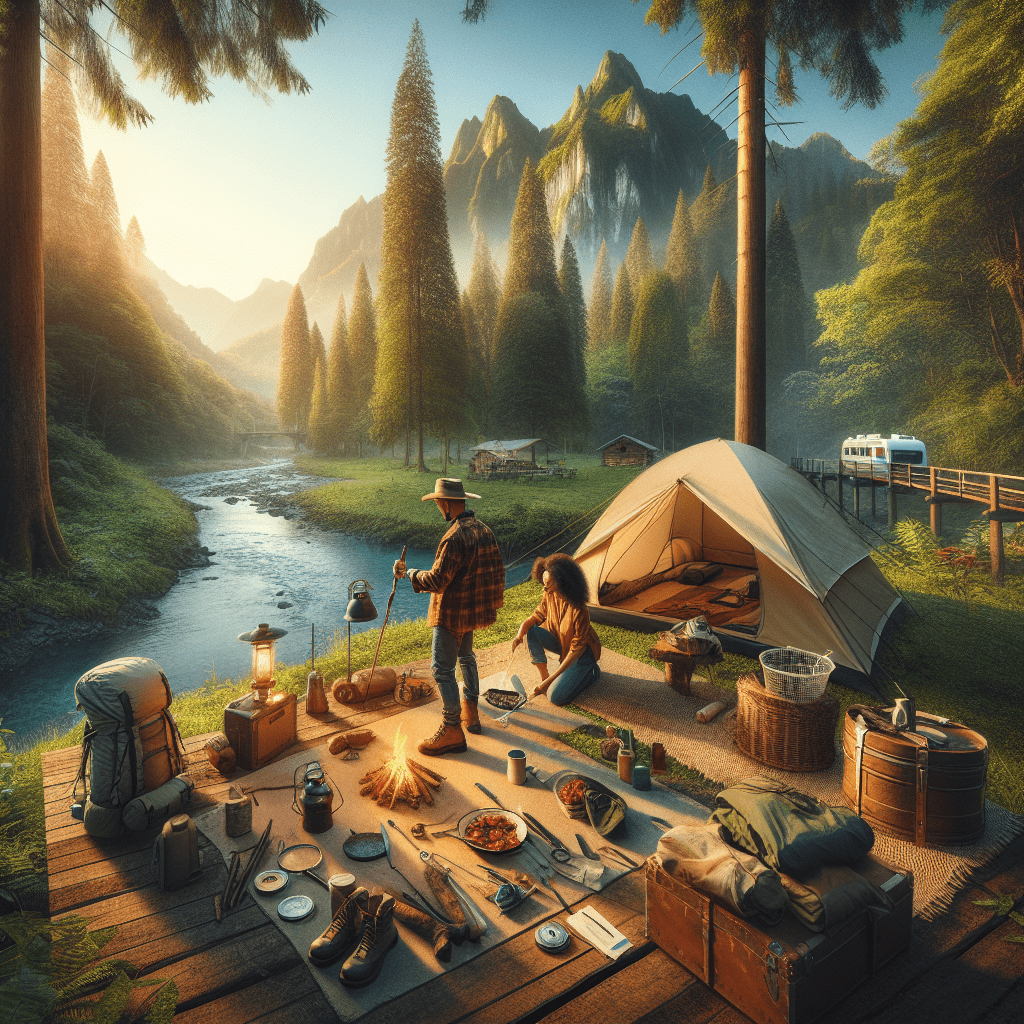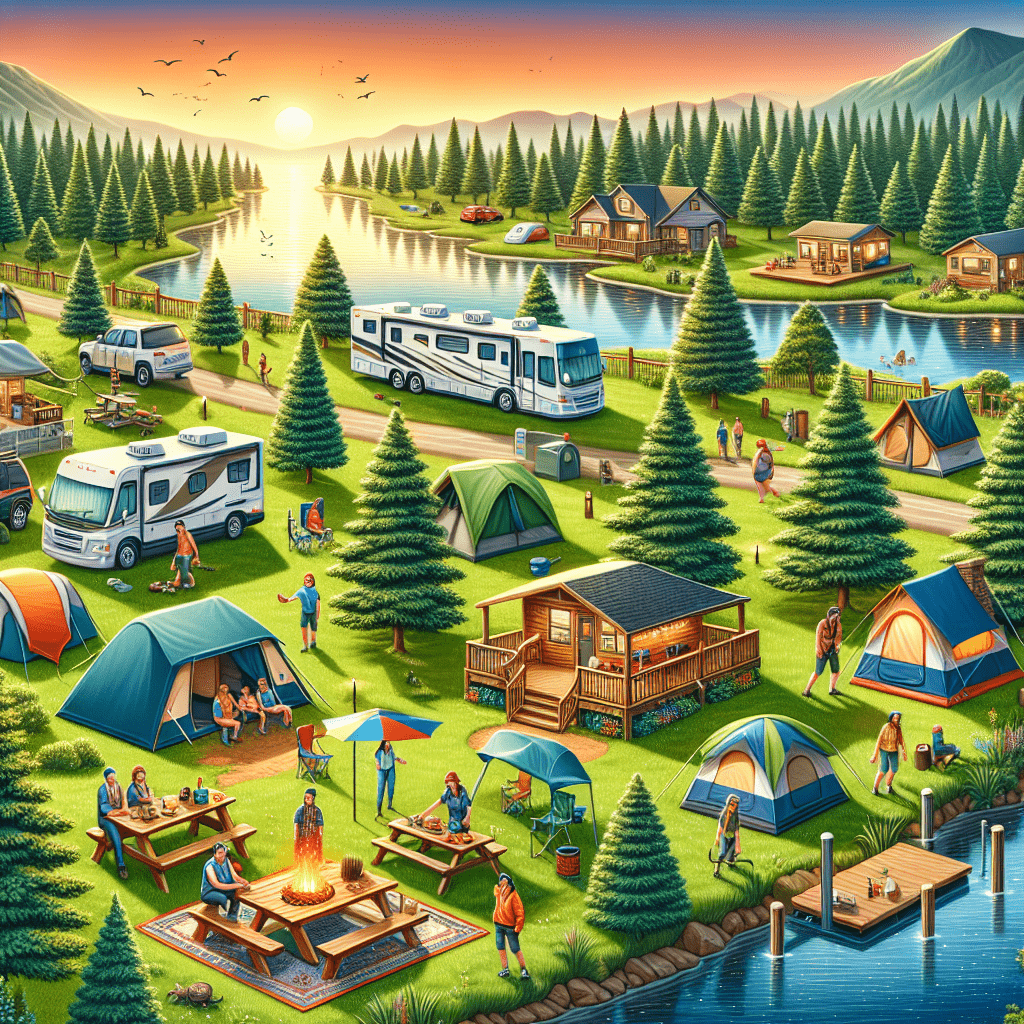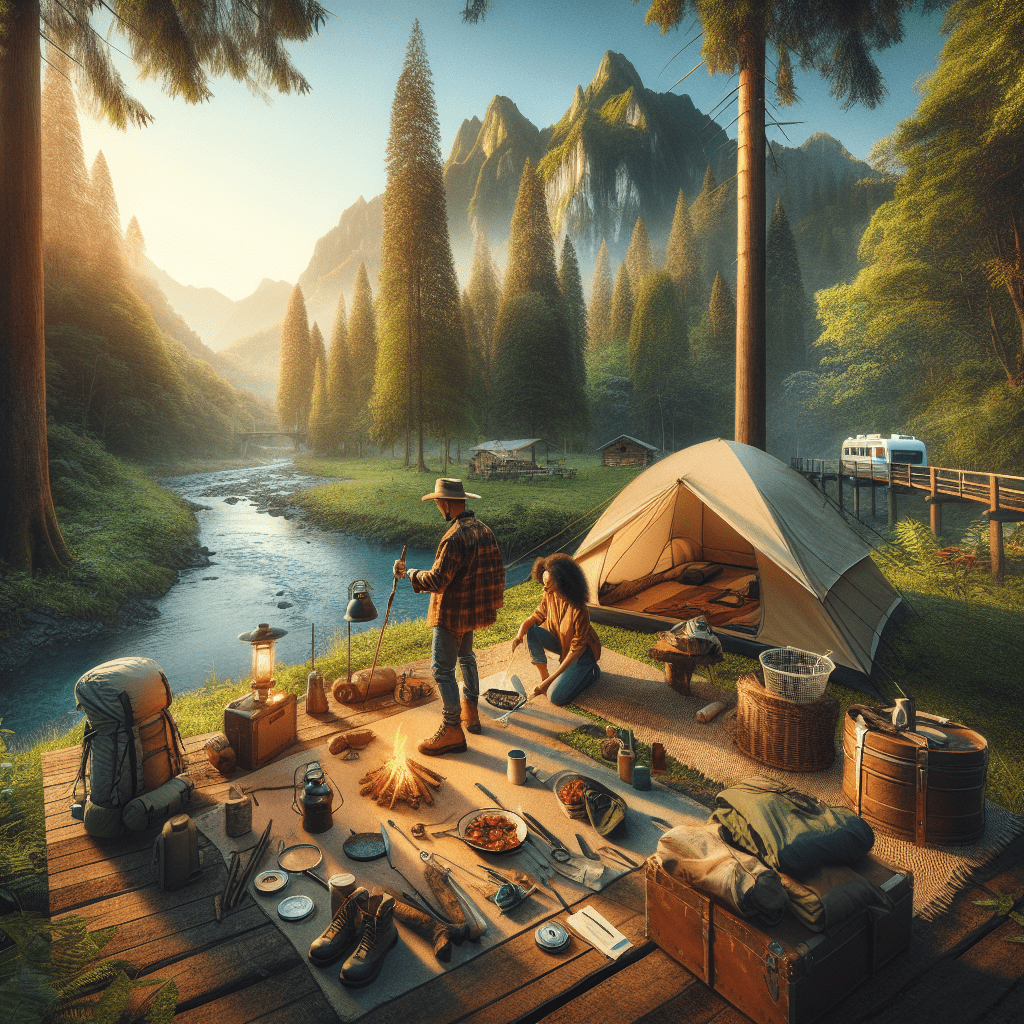
Planning a camping trip can be an exciting adventure, but finding the right accommodations can sometimes be a challenge. That’s why we’re here to help! In this article, we will guide you through the process of finding camping facilities and making reservations. Whether you’re looking for a cozy campground nestled in the woods or a picturesque spot near the beach, we’ve got you covered. So, buckle up and get ready to embark on your next camping getaway with ease.
Camping Facilities
Types of Camping Facilities
When it comes to camping facilities, there are plenty of options to suit every camper’s preferences. From rustic campsites in remote wilderness areas to fully equipped and amenity-rich campgrounds, you can find a variety of choices. Some popular types of camping facilities include national parks, state parks, and private campgrounds. Each type offers a unique camping experience, allowing you to choose the setting that best fits your needs and desires.
Amenities at Camping Facilities
Camping facilities often offer a range of amenities to make your outdoor adventure comfortable and enjoyable. These amenities can vary depending on the type of camping facility. National parks and state parks usually provide essential amenities such as picnic tables, fire rings, and access to drinking water. Moreover, some campgrounds offer additional amenities like flush toilets, hot showers, electric hookups, and even Wi-Fi. It’s important to consider what amenities are important to you and choose a camping facility that meets your requirements.
Accessibility of Camping Facilities
Camping facilities strive to be accessible to all campers, regardless of their needs. While some camping sites may be more remote and require a hike-in or backpacking approach, many camping facilities offer accessible options. This can include designated accessible campsites, restrooms, and facilities that comply with ADA (Americans with Disabilities Act) regulations. It’s always a good idea to check with the camping facility beforehand to ensure they can accommodate any specific accessibility requirements you may have.
Reservation Options
Online Reservations
In this digital age, online reservations have become a convenient and popular option for campers. Many camping facilities offer online reservation systems that allow you to book your campsite in advance from the comfort of your own home. Online reservations typically require you to provide information such as your desired dates, location preferences, and personal details. This option is great for those who prefer the ease and efficiency of making reservations online.
Phone Reservations
For those who prefer a more personal touch, phone reservations are a fantastic option. Many camping facilities have dedicated reservation phone lines where you can speak to a staff member who will guide you through the reservation process. This option allows you to ask any questions you may have and receive personalized assistance in selecting the best campsite for your needs.
Walk-in Reservations
If you prefer a more spontaneous camping experience or enjoy the thrill of uncertainty, walk-in reservations can be a fun and adventurous option. Some camping facilities allow campers to simply show up at the campground and inquire about available campsites on a first-come, first-served basis. This option is perfect for those who enjoy flexibility and don’t mind taking the chance of availability.

Reservation Process
Selecting Dates and Location
When making a reservation, the first step is to decide on the dates you plan to go camping and the location you wish to visit. Consider the time of year, weather conditions, and any specific events or attractions in the area. Once you have determined your desired dates and location, you can move forward with the reservation process.
Checking Availability
Before finalizing your reservation, it’s essential to check the availability of campsites at your chosen location. Some camping facilities have limited capacity and may fill up quickly, especially during peak season or popular holiday weekends. It’s recommended to check the camping facility’s website or call their reservation line to ensure there are available sites for your desired dates.
Providing Personal Information
To complete your reservation, you will need to provide some personal information. This typically includes your name, contact information, number of campers, and sometimes vehicle details. Ensure you provide accurate information as it will be used for check-in purposes and to contact you regarding any reservation-related matters.
Reservation Policies
Cancellation Policies
Life can be unpredictable, and sometimes plans change. It’s important to familiarize yourself with the reservation facility’s cancellation policies. These policies outline the timeframe for cancellation without penalty and any associated fees. Some camping facilities may offer refunds for cancellations made within a certain period, while others may have stricter policies. Understanding the cancellation policies before making a reservation will give you peace of mind and help avoid any potential issues.
Refund Policies
In addition to understanding the cancellation policies, it’s crucial to be aware of the refund policies. Refund policies vary from one camping facility to another, so it’s important to review the specific terms and conditions regarding refunds. Some facilities may offer full or partial refunds if you cancel within a certain period, while others may have non-refundable fees. Familiarize yourself with the facility’s refund policies to know what to expect if you need to cancel your reservation.
Reservation Changes
Life is full of unexpected twists and turns, and sometimes you may need to make changes to your camping reservation. Whether it’s adjusting the number of campers or switching to a different campsite, it’s important to understand the reservation facility’s policies regarding changes. Some facilities may allow changes without penalty within a certain timeframe, while others may charge fees or have restrictions on modifications. Being aware of the reservation change policies will help you navigate any necessary adjustments smoothly.

Popular Camping Destinations
National Parks
National parks are treasure troves of natural beauty and offer memorable camping experiences. From iconic destinations like Yellowstone National Park to breathtaking wonders like Grand Canyon National Park, there are numerous national parks to explore. These parks often provide well-maintained campgrounds with scenic views, hiking trails, and nature activities. Camping in national parks allows you to immerse yourself in the wonders of nature while enjoying the amenities and services provided.
State Parks
State parks are another excellent option for camping enthusiasts. Each state has its own collection of parks, each with its unique charm and character. State parks often offer a range of recreational activities such as hiking, fishing, boating, and wildlife viewing. These parks usually provide well-kept campgrounds with basic amenities, allowing you to enjoy the natural beauty of the area.
Private Campgrounds
Private campgrounds offer a distinct camping experience and can often be found in various locations across the country. These campgrounds are typically owned and operated by individuals or organizations and may offer a wide range of amenities and services. From family-friendly campgrounds with pools and playgrounds to secluded campsites for a peaceful retreat, private campgrounds cater to different preferences and interests.
Seasonal Availability
Peak Season
During peak season, camping facilities tend to be in high demand, and reservations can be more challenging to secure. Peak season typically corresponds with the most favorable weather conditions and popular vacation periods, such as summer holidays. It’s advisable to book your campsite well in advance to ensure availability during peak season.
Off-season
Off-season camping provides a quieter and less crowded experience, with fewer people venturing out during this time. Off-season periods often occur during the shoulder seasons when the weather may be less predictable or during colder months. However, some campgrounds still operate during the off-season, and for those seeking solitude and tranquility, this can be an ideal time to go camping.
Shoulder Season
The shoulder seasons are the transition periods between peak and off-season. These seasons, usually spring and fall, offer the advantage of mild weather, fewer crowds, and often discounted rates. Shoulder season camping can be a great opportunity to enjoy the beauty of nature without the bustling crowds, making it an appealing option for many campers.
Price and Fees
Camping Fees
Camping fees vary depending on the type and location of the camping facility. National and state parks often charge a nightly camping fee, which helps maintain the facilities and supports conservation efforts. Private campgrounds may have different fee structures based on the amenities and services provided. It’s important to check the camping facility’s website or contact them directly to obtain accurate and up-to-date information on camping fees.
Additional Charges
In addition to camping fees, some camping facilities may have additional charges for specific amenities or services. This can include fees for electric hookups, showers, firewood, or extra vehicles. It’s important to inquire about any potential additional charges before making a reservation to avoid any surprises during your camping trip.
Discounts and Promotions
Many camping facilities offer discounts or promotions for various groups such as seniors, military personnel, or members of specific organizations. It’s worth checking if you qualify for any discounts when making your reservation. Additionally, some camping facilities may have special promotions or package deals during certain times of the year, providing an opportunity to save money or enhance your camping experience.
Preferred Camping Equipment
Tents
A tent is an essential piece of camping equipment. When selecting a tent, consider factors such as size, weather resistance, and ease of setup. Different types of tents are available, including dome tents, cabin tents, and backpacking tents, each designed for specific camping needs. It’s important to choose a tent suitable for the number of campers and the expected weather conditions during your camping trip.
Sleeping Bags
A comfortable and suitable sleeping bag is crucial for a good night’s sleep while camping. Sleeping bags come in various shapes, sizes, and temperature ratings. It’s important to select a sleeping bag that matches the expected weather conditions, ensuring you stay warm and comfortable throughout the night. Additionally, consider factors such as insulation type, weight, and packability when choosing a sleeping bag.
Cooking Equipment
Preparing meals while camping can be a fun and enjoyable experience. Important cooking equipment includes a portable stove or grill, cookware, utensils, and food storage containers. Depending on your camping style and preferences, you may also consider bringing additional items like a cooler, campfire cooking tools, and a camping coffee maker. Ensuring you have the necessary cooking equipment allows you to enjoy delicious meals amidst the beauty of the outdoors.
Safety Considerations
Campsite Security
While camping is generally a safe and enjoyable activity, it’s essential to prioritize safety and security during your trip. When selecting a campsite, consider factors such as visibility, proximity to water sources, and the presence of any potential hazards. It’s important to follow any safety guidelines provided by the camping facility and take precautions to secure your belongings. Locking up valuable items, keeping a tidy campsite, and being aware of your surroundings can help ensure a safe and worry-free camping experience.
Emergency Preparedness
Being prepared for emergencies is crucial when camping. Pack a first aid kit with essential supplies and medications, as well as a flashlight, extra batteries, and a fully charged cell phone. Familiarize yourself with the campground’s emergency procedures and know the location of the nearest medical facilities. Additionally, it’s advisable to inform someone of your camping plans and expected return date, providing an extra layer of safety in case of unexpected situations.
Rules and Regulations
Camping facilities typically have rules and regulations in place to ensure the safety and enjoyment of all campers. These rules often include guidelines regarding quiet hours, campfire safety, and pet policies. It’s important to familiarize yourself with these rules and abide by them during your camping trip. Respecting the natural environment, other campers, and following the facility’s rules will help create a positive camping experience for everyone.
Additional Resources
Camping Guidebooks
Camping guidebooks can be a valuable resource when planning your outdoor adventure. These guidebooks provide information on camping facilities, amenities, and activities in various locations. They often include maps, campsite descriptions, and useful tips for camping. Guidebooks can help you discover new camping destinations, learn about popular trails, and provide insights into the best camping practices.
Websites and Apps
The internet provides a wealth of information for campers. Numerous websites and apps offer campground directories, reviews, and reservation services. Websites like ReserveAmerica, Recreation.gov, and individual camping facility websites can help you find and reserve campsites. Additionally, apps like Campendium and AllTrails provide user-generated reviews and recommendations, aiding in finding the perfect camping destination.
Camping Communities
Joining camping communities, whether online or in person, can enrich your camping experience. Online forums and social media groups allow you to connect with fellow campers and exchange tips, experiences, and recommendations. Additionally, attending camping-related events, workshops, or joining local camping clubs can provide opportunities to meet like-minded individuals and expand your camping knowledge.
In conclusion, camping facilities offer a range of options for outdoor enthusiasts, from national parks to private campgrounds. Choosing the right facilities and making reservations can be done through various methods including online, phone, or walk-in. Understanding reservation policies, seasonal availability, and camping fees is essential for a smooth camping experience. Equipping yourself with the preferred camping equipment, prioritizing safety considerations, and utilizing additional resources like guidebooks, websites, and camping communities can help create unforgettable camping adventures. So, pack your tent, grab your camping gear, and embark on a journey to reconnect with nature and create lasting memories.